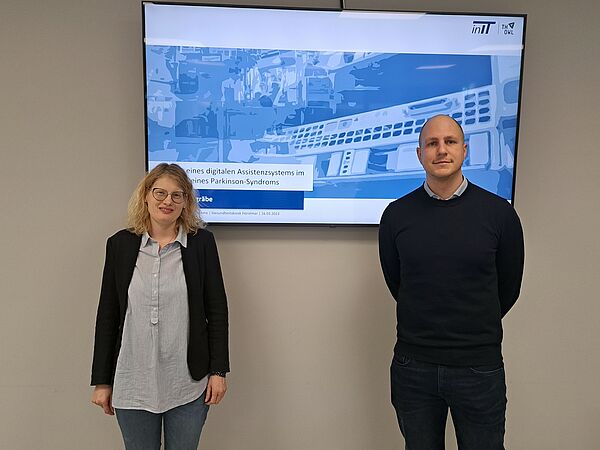Sebastian Ziemba reported on the topics of Ambient Assisted Living (AAL) and Smart Home. Ambient Assisted Living stands for concepts, products and services that introduce new technologies into everyday life in order to increase the quality of life for people in all phases of life, especially in old age. AAL is to be understood as an extension of the Smart Home. Technologies that the Smart Home provides in the control and monitoring of mechanisms in the home are also used here.
Frauke Wiegräbe, research assistant at inIT, described in her presentation how Artificial Intelligence (AI) for mobile health systems is increasingly establishing itself as a core technology in the healthcare sector. She illustrated this with a Parkinson's app developed by inIT in cooperation with the Klinikum Lippe-Lemgo, Department of Neurology and Neurogeriatrics.
The doctors at the clinic often only see the Parkinson's patients for a short time and only receive partial information about their medication and mobility. However, this snapshot does not reflect the patient's full day-to-day life. A good therapy strategy can only be developed if the home environment can be taken into account. The Discrete Systems working group under the leadership of Prof. Volker Lohweg therefore developed an application that records the physical activity of those affected on the one hand and documents the medication on the other. The app offers the patients a communication channel for electronic consultation with the treating actors in the health care system and thus leads to improved overall care and quality of life.
Another goal of using the Parkinson's app is AI-supported diagnostic support based on the collected data. For the doctors, the app should show an effective and quality-assured documentation of the general physical activity in the course of the day in order to ensure a long-term documentation and monitoring of real life data for the early detection of motor problems and complications of the treatment. In the future, the app will be part of a digital platform. The application is already in use at the Klinikum Lippe-Lemgo, where the first tests and evaluations of anonymised movement and therapy data have been successfully carried out.


